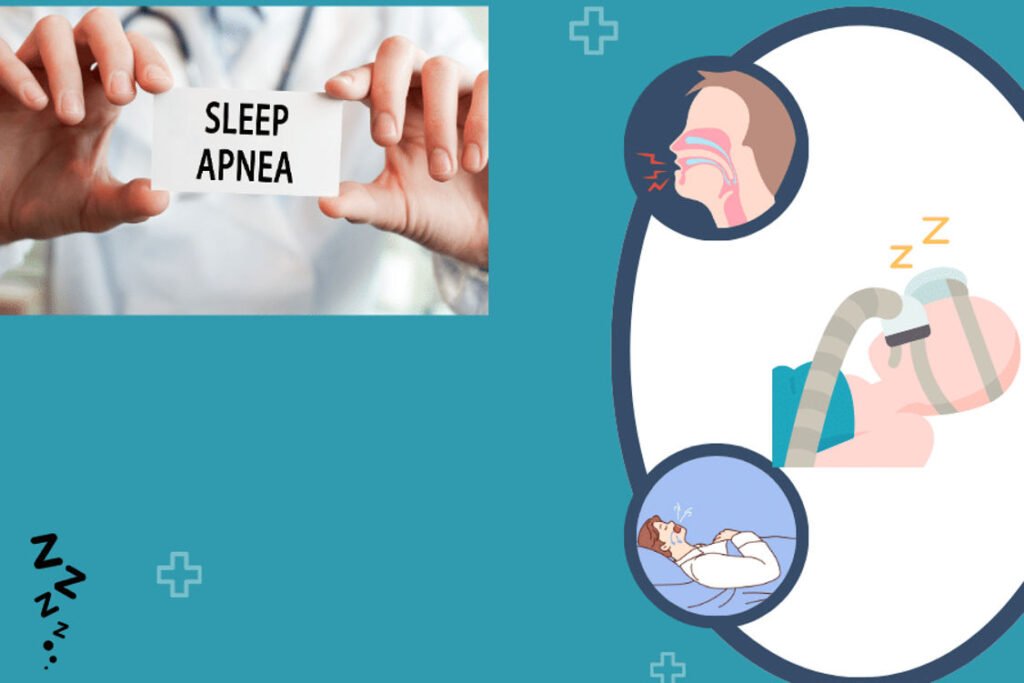Sleep apnea, often dismissed as just loud snoring, can be a silent and frightening health condition. It disrupts your sleep by causing your breathing to repeatedly stop and start throughout the night. While the gasping or choking sounds can be alarming to your sleep partner, the true horror lies in the unseen consequences of untreated sleep apnea.
This article dives deep into the scary aspects of sleep apnea, exploring its symptoms, health risks, and the impact it has on your daily life. We’ll also unveil the good news: effective treatments are available to turn this nighttime monster into a manageable condition.
The Haunting Symptoms of Sleep Apnea
Sleep apnea’s symptoms might seem like the stuff of nightmares:
- Choking and Gasping: Imagine waking up gasping for air, your body desperately trying to restart your breathing. This is a common experience for those with sleep apnea.
- Loud Snoring: Nighttime rackets are a hallmark of sleep apnea. The snoring can be so loud it disrupts not only your partner’s sleep but also your own.
- Excessive Daytime Sleepiness: The disrupted sleep pattern leaves you feeling exhausted during the day. You might find yourself constantly fighting the urge to nap, impacting your productivity and alertness.
- Morning Headaches: Waking up with a dull ache in your head can be a sign of sleep apnea’s impact on oxygen levels.
- Mood Swings and Irritability: Chronic sleep deprivation can lead to increased frustration, mood swings, and even symptoms of depression.
- Memory Problems and Difficulty Concentrating: Sleep apnea can impair your cognitive function, making it hard to focus and remember things.
These symptoms can be scary and disruptive but are also a warning sign. Left untreated, sleep apnea can lead to even more frightening consequences.
The Monster in the Shadows: Health Risks of Sleep Apnea
Untreated sleep apnea is a ticking time bomb for your health. The constant struggle to breathe during sleep puts a strain on your body:
- High Blood Pressure and Heart Disease: The lack of oxygen stresses your heart, increasing the risk of high blood pressure, heart attack, and stroke.
- Type 2 Diabetes: Sleep apnea can disrupt your body’s ability to regulate blood sugar, increasing your risk of developing type 2 diabetes.
- Weight Gain: The disrupted sleep cycle can affect your hormones, making it harder to lose weight or maintain a healthy weight.
- Increased Risk of Accidents: Drowsiness from sleep apnea can significantly increase your risk of car accidents and other injuries.
These are just some of the potential health complications. Sleep apnea can also worsen other health conditions like asthma and chronic obstructive pulmonary disease (COPD).
Living with a Monster: The Impact of Sleep Apnea on Daily Life

The consequences of sleep apnea extend far beyond physical health. It can affect every aspect of your daily life:
- Strained Relationships: Loud snoring and constant fatigue can lead to tension and conflict with your partner.
- Work Performance: Chronic sleepiness can make it difficult to concentrate, impacting your productivity and performance at work.
- Social Life: You might find yourself withdrawing from social activities due to exhaustion or feeling constantly out of sorts.
- Reduced Quality of Life: Overall, sleep apnea can significantly reduce your quality of life and well-being.
Imagine living with a constant monster under your bed, draining your energy and impacting every aspect of your life. Sleep apnea doesn’t have to be this way.
Banishing the Monster: Effective Treatments for Sleep Apnea
The good news is that sleep apnea is a treatable condition. Here’s how to fight back:
- CPAP Therapy: The gold standard treatment for sleep apnea, CPAP (continuous positive airway pressure) uses a mask to deliver a gentle stream of air that keeps your airway open while you sleep.
- Oral Appliances: For mild or moderate sleep apnea, a specially designed mouthpiece can help keep your airway open.
- Lifestyle Changes: Losing weight, avoiding alcohol before bed, and quitting smoking can all improve symptoms.
- Surgery: In some cases, surgery might be an option to address anatomical problems causing sleep apnea.
By getting diagnosed and treated, you can take back control of your sleep and your life.
FAQs
Is sleep apnea severe?

Yes, sleep apnea can be severe. Here’s a quick summary of why:
- Health Complications: Untreated sleep apnea raises your risk of major health problems like heart disease, stroke, and diabetes.
- Daytime Dangers: Constant sleep deprivation can lead to excessive daytime sleepiness, increasing your risk of accidents while driving or operating machinery.
- Reduced Quality of Life: Chronic fatigue, mood swings, and cognitive problems can significantly impact your daily life and relationships.
However, there’s also good news:
- Treatable: Effective treatments like CPAP therapy and lifestyle changes can manage sleep apnea and prevent these complications.
- Diagnosable: A sleep study can diagnose sleep apnea, allowing you to take control of your health.
If you suspect you might have sleep apnea, don’t hesitate to talk to your doctor. Early diagnosis and treatment are key to preventing the serious health risks associated with sleep apnea.
How life-threatening is sleep apnea?
Sleep apnea itself isn’t directly life-threatening in most cases. However, the long-term health complications it can cause can be serious and even deadly. Here’s a breakdown of the risks:
Increased Risk of Death:
- Sudden Cardiac Death: Research suggests a link between severe sleep apnea and a higher risk of sudden cardiac death during sleep, especially in older adults with low oxygen levels.
- Worsened Health Conditions: Sleep apnea can worsen existing health conditions like heart disease and stroke, which can be life-threatening.
These risks are relatively rare, but they highlight the importance of not ignoring sleep apnea.
Here’s what makes sleep apnea dangerous:
- Chronic Oxygen Deprivation: During sleep apnea, your oxygen levels drop. This constant stress on your body can lead to various health problems over time.
- Increased Blood Pressure: The body struggles to breathe during apneas, straining your cardiovascular system and raising blood pressure.
- Disrupted Sleep Cycle: Fragmented sleep due to apneas leaves you chronically sleep-deprived, impacting your overall health and well-being.
Early diagnosis and treatment are crucial to prevent these complications. Proper treatment can significantly reduce the risks associated with sleep apnea and improve your overall health.
Is it hard to live with sleep apnea?
Yes, living with untreated sleep apnea can be quite difficult. Here’s a closer look at the challenges it presents:
Physical Challenges:
- Constant Fatigue: Disrupted sleep due to apneas leaves you feeling perpetually tired, making it hard to function throughout the day.
- Morning Headaches: The lack of oxygen during sleep can lead to frequent headaches upon waking.
- Weight Gain: Sleep apnea can disrupt hormones that regulate appetite, making it harder to lose or maintain a healthy weight.
- Increased Risk of Accidents: Drowsiness from sleep deprivation significantly increases your risk of car accidents and other injuries.
Mental and Emotional Challenges:
- Mood Swings and Irritability: Chronic sleep deprivation can lead to increased frustration, mood swings, and even symptoms of depression.
- Memory Problems and Difficulty Concentrating: Disrupted sleep can impair cognitive function, making it hard to focus and remember things.
- Strained Relationships: Loud snoring and constant fatigue due to sleep apnea can cause tension and conflict with your partner.
Social Challenges:
- Reduced Social Life: You might find yourself withdrawing from social activities due to exhaustion or feeling constantly out of sorts.
- Reduced Quality of Life: Overall, sleep apnea can significantly reduce your enjoyment of life and well-being.
Living with these challenges day in and day out can be very difficult. It can take a toll on your physical and mental health, as well as your relationships and overall enjoyment of life.
The good news is that sleep apnea is a treatable condition. With proper diagnosis and treatment, you can significantly alleviate these challenges and reclaim your energy, focus, and overall well-being. Don’t hesitate to talk to your doctor if you suspect you have sleep apnea.
Do people with sleep apnea sleep deeply?
Sure! People with sleep apnea typically do not sleep deeply. This is because their sleep is constantly interrupted by apneas, which are brief periods when breathing stops or becomes very shallow. As a result, people with sleep apnea often wake up feeling tired and unrested, even if they have slept for many hours.
| Sleep Apnea | Deep Sleep |
|---|---|
| Yes | No |
| No | May be短暂 (duàn zàn) brief periods |
Conclusion: Sleep Apnea Doesn’t Have to Be Scary
Sleep apnea can be a frightening condition, but it doesn’t have to be a life sentence. By recognizing the symptoms, understanding the health risks, and seeking treatment, you can turn this monster under the bed into a manageable problem. Talk to your doctor if you suspect you might have sleep apnea. Take back control of your sleep and reclaim your health and well-being.

I’m a seasoned content creator with 6+ years of experience crafting engaging, SEO-optimized content that drives traffic and rankings. I excel in keyword research, link building, and guest posting, ensuring your brand reaches new heights.

